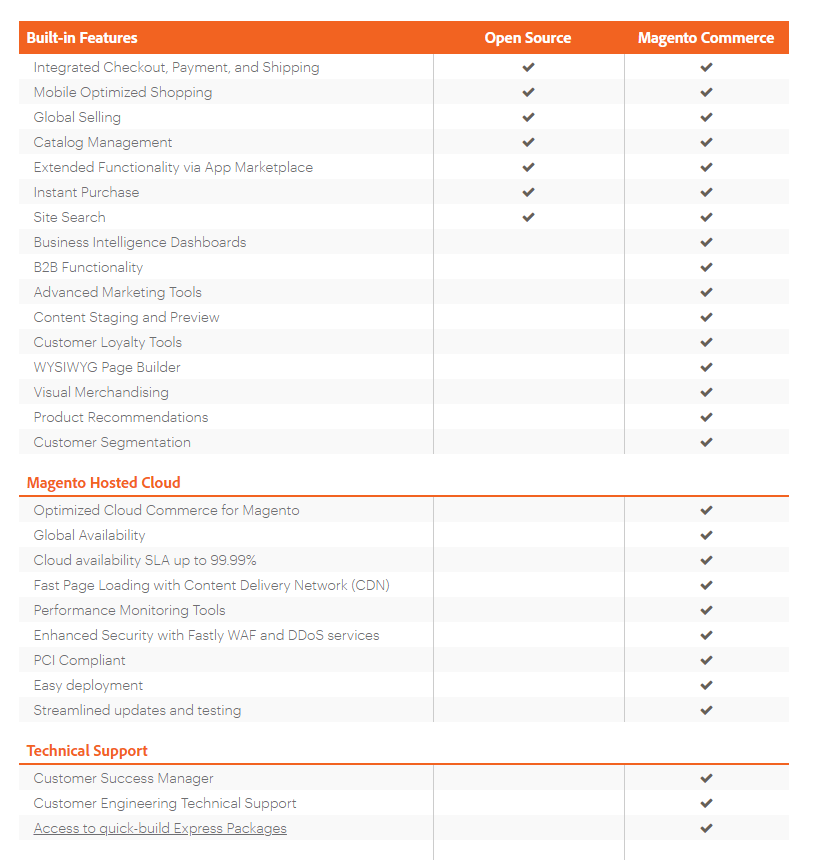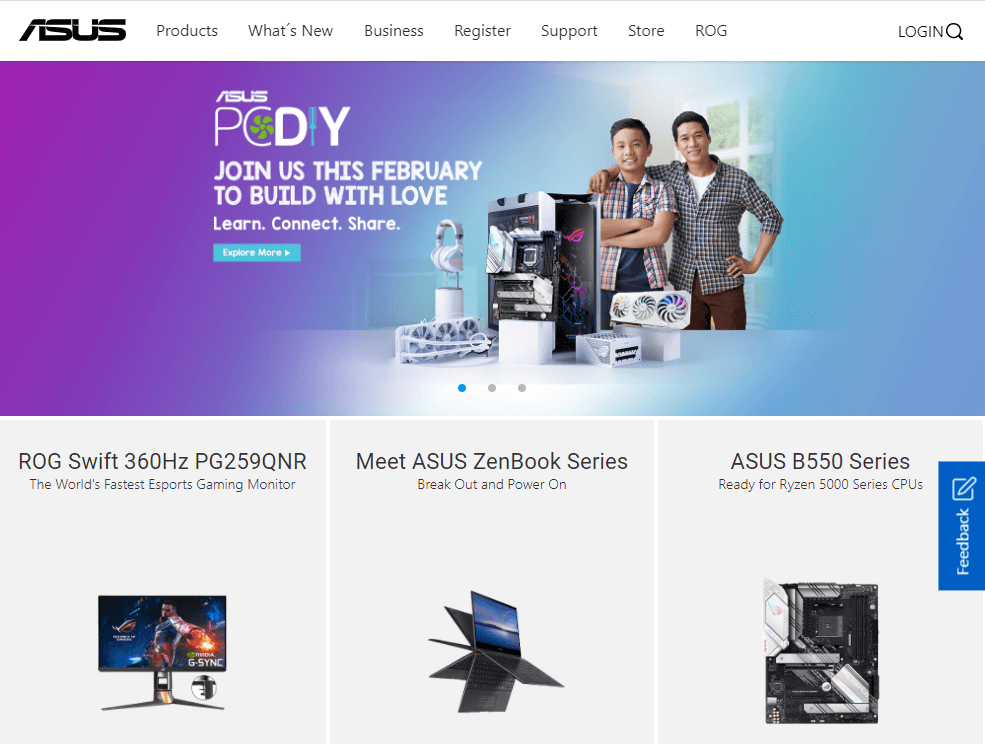Magento and Salesforce Commerce Cloud are the two market leaders in the B2B Ecommerce platform world. They are born to serve a range of ecommerce demands from small to big enterprises with complex structures and many integrations and third-party systems.
If you plan to start an ecommerce website and consider Magento vs Salesforce Commerce Cloud, you should not ignore this state-to-the-art article. We do quite in-depth research to provide you with highlighted comparisons between these two ecommerce platforms: both B2B and B2C sides.
This article will concentrate on comparing Magento Commerce and Salesforce Commerce Cloud to help you understand better these two advanced editions from Magento vs Salesforce.
For more interests, let’s take a look at some e-commerce platform comparisons to broaden your choices:
Overview About Magento Commerce
Table of Contents
Magento Commerce is another Magento edition in addition to Open Source and Commerce Cloud. Magento Open Source is entirely free to use and customize, while Commerce and Commerce Cloud takes you a considerable amount of cost for ownership based on your annual revenue.
Magento Commerce and Open Source share plenty of common features, but the Commerce edition embraces more special functions such as B2B features, Order Management, Page Builder, and so on.
To know the difference between Magento Open Source and Commerce, let’s read this article: Magento 2 Community Vs Enterprise – Don’t Use Magento Until You Read This and a general comparison in the following image that was born by Magento.
 Pros:
Pros:
- Support multi-stores for optimized management on the only one Magento installation
- Include B2B functionality to help wholesalers improve customer experience
- Infinite scalability allows users to customize freely. This one can be both pros and cons but is considered better than other SasS platforms.
- Smart content management – Page builder to quickly generate dynamic content
- Business Intelligence
- Strong order and inventory management
Cons:
- Long time to launch a website
- The high cost of ownership
- Required technical skills to use
Meanwhile, Magento Commerce Cloud is quite the same as the Commerce edition, other than it is a cloud-based service to provide you with the benefit of instant access to the latest software version, infrastructure improvements, and functionality. It contains a lot of highlighted advantages in addition to available features of the Commerce edition:
- PCI Compliant environment
- 99.99% Cloud Availability SLA
- Full Page Caching and Image Optimization for high performance
- Built-in security and performance monitoring tools
- Continuous Infrastructure upgrades and performance enhancements

- ASUS – a successful Magento Commerce business
Overview about Salesforce Commerce Cloud
Salesforce Commerce Cloud is a cloud-based SaaS (Software as a Service) eCommerce solution that offers high scalability, out-of-box features, and functionality to assist store owners in building and optimizing their online business.
Salesforce Commerce Cloud has been one of the best solutions born to target retailers with built-in B2C functionality. Still, now it has launched B2B Commerce Cloud to accelerate wholesale business.
Pros:
- The SaaS-based platform lets users save much time and money in business development because Salesforce manages all (server, upgrade, maintenance,…)
- Robust merchandising functionality to quickly build a storefront without any difficulties.
- Effective catalog management
- Highly personalized and machine learning experience via Commerce Insights
- The omnichannel solution to serve customers on multi-channels and high synchronization
- Internalization support with multi-currency, multi-language, and multi-stores
Cons:
- Limited customization range
- Unpredictable total costs
- Limited 3rd party integrations

- Adidas uses Salesforce Commerce Cloud to build its website.
Magento vs Salesforce Commerce Cloud
Platform types
The first difference between Salesforce Commerce Cloud vs Magento is the nature of the platform.
Magento Commerce is an on-premise or self-hosted platform that gives store owners full control and direct access to the hardware. However, it may request some more investment and regularly monitoring and maintaining servers.
Using Magento under the self-hosted platform, users can get the best security, improved website performance, and open-source code to freely customize and add more desired functions to the platform.
Meanwhile, Salesforce Commerce Cloud is a cloud-based SaaS platform that frees users from worries of server, hosting, networks, and even cybersecurity. There is no need to hire a server and enjoy excellent services at a low cost, high performance, guaranteed security, and highly scalable capability.
However, Salesforce Commerce Cloud limits user’s flexibility by restricting their access to the server and the source code. This disadvantage prevents users from customizing or modifying the code to meet their specific needs.
When comparing Magento vs Salesforce Commerce Cloud, it is said that each platform contains particular advantages and disadvantages. Hence, to choose the one to fit your website, you need to take into careful and more comprehensive consideration under various aspects.
Total ownership costs
As mentioned above, Magento Commerce charges users based on their annual revenue, starting from $24,000 per year and giving an increase accompanied with the turnover tiers. If you are a new Magento Commerce comer, you can be allowed to pay a license fee monthly during the first year of usage.
Costs of each Magento Edition (per year)
| Aver. Gross Sale Revenue per year | Open Source | Commerce | Commerce Cloud |
| <$1,000,000 | $0 | $22,000 | $40,000 |
| $1,000,000 – $5,000,000 | $0 | $32,000 | $55,000 |
| $5,000,000 – $10,000,000 | $0 | $49,000 | $80,000 |
| $10,000,000 – $25,000,000 | $0 | $75,000 | $125,000 |
| >$25,000,000 | $0 | $125,000 | $190,000 |
Furthermore, the total ownership cost of Magento Commerce is not quite expensive because you get complete access to many valuable tools: Business Intelligence, Page Builder, B2B modules, Fastly, CDN. The one-time payment brings plenty of benefits, especially your control to manage and customize your website – the flexibility and extensibility value of money.
Unlike Magento, Salesforce pricing is built on the “share success” principle, or the license fee calculation follows a GMV model (Gross Merchandise Value). It means that users have to pay an amount of fee that accounts for 2-3% of total GMV to get the ownership. On the other hand, you need to send Salesforce a “success tax” – the more money you earn, the more fees you are charged.
| Starter Tier | Growth Tier | Unlimited Tier |
| 1 website/store and 2 price books | 5 websites/stores and 10 price books | Unlimited |
| ~1% of GMV | between 1-2% of GMV | ~ 2% of GMV |
Hence, you can calculate the fee for Magento, but the Salesforce ownership cost is unpredictable because it potentially varies significantly over time. Consequently, there are many difficulties in planning and executing website development in advance, and the price may fluctuate frequently.
B2B or B2C single platform
Bear in mind that B2B and B2C e-commerce are never the same, containing many differences under certain aspects such as customer segmentation, purchasing behavior, pricing strategies, and so on.
When it comes to Magento Commerce, it was born to be a B2B native ecommerce platform with out-of-box B2B modules included. These functionalities aim to enhance the B2B experience on a website for both buyers and sellers, letting wholesalers strengthen their business with available tools – no need to purchase from third parties.
Furthermore, if you process both B2B and B2C on the same website, Magento Commerce should be your first choice due to its robust capabilities for every business model.
Wanna use Open Source for B2B? Don’t worry! We have Magento B2B extension package for you!
On the contrary, Salesforce Commerce Cloud was designed for B2C eCommerce business – retailing. In case you want to create a unified B2B and B2C experience on a website, Salesforce may not adopt this requirement due to a lack of solutions. Anyone who plans to run B2B2C with Salesforce Commerce Cloud needs to purchase another license, customize the existing one or build two separate websites to meet the demands. And this additional purchase assuredly costs you more money and time to have it work well on your website.
*Note: If you are preparing to build a Magento B2B website, but don’t know where to start, leave us your information in this form. We will contact you as soon as possible to provide you with the most useful consultation.
We do offer a B2B Web development service that commits to delivering a B2B feature-rich website with high quality and good performance.
Magento vs Salesforce Commerce Cloud Features
Being ecommerce platforms, both Magento Commerce and Salesforce Commerce Cloud share many common features to benefit online businesses. But some differences can be their strengths and weaknesses of each platform.
Let’s take a look at the following table to find out some key point when comparing Salesforce Commerce Cloud vs Magento:
| Highlighted Features | Magento Commerce | Salesforce Commerce Cloud |
| Merchandising | – Support various product types (simple, configurable, grouped, bundles, gift card, virtual and downloadable)
– Strong visual merchandiser: optimize category display, y arranging products with a simple drag-and-drop interface or sorting rules, and setting rules to automatically assign products to specific categories – Customers create gift registries for special occasions |
– Support complex product types (standard product, variation master, variation group, variation product, Product set, and product bundle.)
– Visual merchandising: visual sorting via a drag-and-drop positioning |
| Content Management | Page Builder enables store owners to flexibly create content based on available templates and blocks. Users can design their pages without code interference or developers’ help. | New features of content management let users create, tailor, and deliver content fast. This had been a weakness of Salesforce before. |
| Loyalty and rewards | Support reward points to build up the loyalty system.
Support addition functions: store credit, gift registry, … |
Need to purchase tools from partners on Marketplace to build a loyalty program. |
| Omni channels | Magento does provide a separate Omni channel product to combine brick-to-mortar and click-to-mortar stores, customers can buy anywhere they want and store owners synchronize product, order & sale data in the only system. | Omni channel capabilities are contained in the Salesforce platform for users to build a seamless experience from online to offline. |
| Commerce insights | Use Adobe Sensei powers for product recommendations, delivering a more relevant experience for every shopper. | Use Einstein to gather insight and analyze customer behavior for personalization and product recommendations. |
| B2B features | Provide some essential functions:
– Company account – Quote – Shared Catalog – Quick order – Requisition list – Purchase order |
Limited B2B features are supported:
– Custom catalog – Negotiated pricing (Quote) – Purchase orders |
Salesforce Commerce Cloud vs Magento: The features comparison
Third-party integrations
Magento Marketplace is a rich resource for every user to get needed extensions and integrations to fulfill their requirements. More than 2,000 products and services are listed on this Marketplace now and cover almost every aspect of an online business.

Meanwhile, Salesforce offers fewer 3rd-party integrations than Magento does to enhance the superior customer experience. Besides, users have to pay more or customize more for integrations that Salesforce does not support.
Customization and Extensibility
As mentioned above, Magento is an open-source platform that gives store owners and developers more control over customization and flexibility. The purpose of this capability is to help Magento users quickly scale up their business, depending on their customer side or even their management demands.
With thousands of extensions and integrations, users are given a massive number of options to install for websites and make significant improvements to the shopping experience and business operation.
However, customizing a Magento store will be challenging if you are not equipped with the advanced technical knowledge. For that reason, it is suggested that you should hire a reputable Magento agency to perform the customization to save much time and cost.
With 11+ years of experience in conducting thousands of successful projects for worldwide clients, our certified Magento experts will effectively enhance your store functionalities with their robust expertise. Check out our Magento 2 development service now.
In terms of customization and extensibility, Salesforce Commerce Cloud is less potent than Magento. Being a SaaS platform limits users to access and make adjustments. Thus, it is limited to innovate and deliver better experiences.
Magento vs Salesforce Commerce Cloud: Which one is better?
To decide on an ecommerce platform that fits your business requirements and budget is not a simple task. The detailed analysis concentrates on some key points of Salesforce Commerce Cloud vs Magento com in the most obvious way.
However, there are four reasons why we should consider Magento instead of Salesforce Commerce as below:
- Magento provides us no-limit customization capabilities: every user is granted the right access to the source code, and thousands of extensions are developed to help the better shopping experience. On the contrary, based on SaaS architecture, Salesforce limits the scope of customization, and the number of extensions is not as diverse as Magento.
- Magento contains powerful native B2B and B2B2C capabilities: brings scalable integration, built-in B2B modules for B2B and B2B2C Ecommerce under the same backend. Whereas, Salesforce forces B2B2C users to manage their business in two different backend admins.
- Magento offers a lower total cost of ownership for the mid-market. Meanwhile, the Salesforce pricing is quite complicated, including base rate plus commission by sales. Salesforce users may be charged more than five times Magento users.
- Magento has a vast community of Partners and Developers, including 120 Technology Partners and about 5,000 certified developers.
Start building Magento business with a ready-made B2B website delivered in 12 hours! <!-
Conclusion
Magento vs Salesforce Commerce Cloud – each platform contains its strengths and weaknesses. Hence, you had better consider more business aspects, your budgets, and goals to pick up the most suitable platform for your online store.
BSS Commerce is one of the leading Multi-platform eCommerce solutions and web development services providers in the world. With experienced and certified developers, we commit to bringing high-quality products and services to optimize your business effectively.
CONTACT NOW if you are having problems in your wholesale business. We are willing to support you every time.

